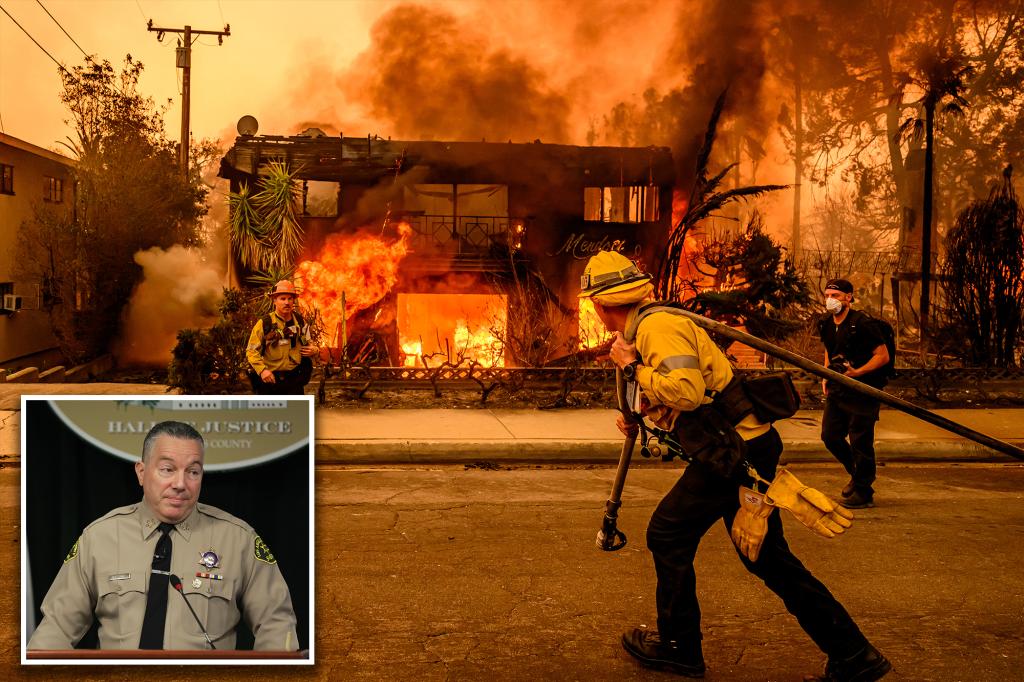The devastating wildfires ravaging Los Angeles have ignited a firestorm of criticism directed at the city’s leadership and their perceived mismanagement of resources, with some former officials attributing the crisis to a “woke” ideology. Former Los Angeles County District Attorney Steve Cooley and ex-Sheriff Alex Villanueva have voiced their dismay over the looting and what they see as a systemic breakdown of city services, including a defunded fire department, depleted reservoirs, and dry fire hydrants. Villanueva argues that the current state of affairs is a direct consequence of the “defund the police” movement that gained traction following the death of George Floyd, leading to a significant shortage of officers in both the LA Sheriff’s Department and the LAPD. He further criticizes the County Board of Supervisors for prioritizing a “care first, jail last” approach to criminal justice, which he believes has emboldened criminals and contributed to the looting amidst the disaster.
The wildfires, which have been burning since January 7th, have left a trail of destruction, with thousands of structures destroyed and 88,000 residents displaced. Amidst the chaos, reports of looting have emerged, with at least 40 individuals arrested for stealing from the charred remains of homes and businesses, including one person disguised as a firefighter. Cooley and Villanueva argue that this lawlessness is a predictable outcome of what they perceive as a lax approach to law enforcement and a general disregard for public safety. This crisis has further exposed the city’s vulnerabilities and the alleged consequences of prioritizing ideology over practical governance, according to these critics.
Adding fuel to the controversy is a video featuring the Los Angeles Fire Department’s Diversity, Equity, and Inclusion (DEI) chief, Deputy Chief Kristine Larson, discussing the physical capabilities of female firefighters. Larson’s comments about whether women are strong enough to rescue men from burning buildings sparked debate, with some interpreting her remarks as victim-blaming while others deemed them a statement of the obvious. Cooley, however, sees the entire episode as a distraction from the fire department’s core mission and a symptom of the city’s obsession with DEI initiatives. He criticizes the apparent focus on these issues over fire preparedness and response, arguing that this misplaced emphasis has contributed to the severity of the current crisis.
Cooley’s concerns extend beyond the fire department, encompassing a broader critique of what he calls the “woke religion” permeating California politics. He believes this ideology has undermined effective governance and led to detrimental policy decisions. He cites the recall movement against Governor Gavin Newsom as evidence of growing public dissatisfaction, but expresses pessimism about its success due to the difficulty of recalling elected officials in California. Criticism has also been directed at Los Angeles Mayor Karen Bass, who was in Africa when the fires began and has been accused of cutting the fire department’s budget and personnel. These decisions, critics argue, have left the city ill-equipped to handle a major emergency.
The scale of the disaster has necessitated a massive mobilization of resources, with over 7,500 firefighters, National Guard members, and emergency responders from across California and neighboring states deployed to combat the blazes, along with federal assistance. However, the visibility and leadership of California Department of Forestry and Fire Protection’s Chief Joe Tyler has been questioned. Tyler held only one press conference, on January 11th, in Sacramento, hundreds of miles from the fires, and his subsequent whereabouts have been unclear, adding to the perception of a disorganized response. The lack of clear communication and direction from top officials has further fueled public anxiety and frustration.
Meanwhile, the firefighters and sheriff’s deputies on the front lines are facing immense strain, working long hours with limited resources. John Satterfield, a retired commander with the Los Angeles Sheriff’s Department, reports that deputies are working 24-hour shifts “with no relief in sight,” a situation he attributes to staffing cuts approved by the Board of Supervisors in 2020. He echoes Cooley and Villanueva’s concerns, claiming that every city and county appointment is driven by an “extreme left-wing agenda,” with a focus on diversity often overshadowing meritocracy and technical competence. Satterfield argues that these hiring practices have compromised the effectiveness of essential services, leaving the city vulnerable to crises like the current wildfires. He asserts that warnings about the long-term consequences of defunding and understaffing public safety departments were ignored, contributing to the current predicament. The ongoing wildfires and the surrounding controversies have sparked a heated debate about governance, resource allocation, and the role of ideology in shaping public policy in Los Angeles.

